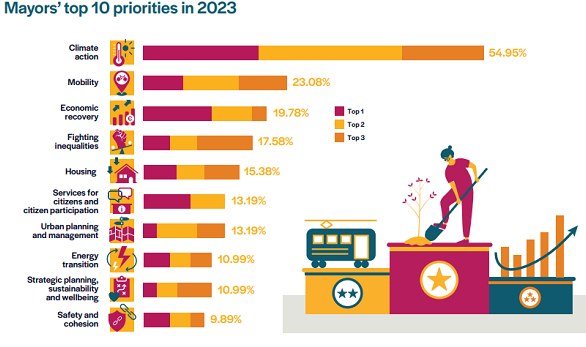
Photo: Lasse Behnke | Dreamstime.com
Climate action ranked as top priority for European mayors
12 June 2023
by Sarah Wray
Climate action is the number one priority for major European cities, with 55 percent of mayors selecting it in new research – more than double any other category.
Eurocities, a collaborative network for European cities, surveyed 92 mayors in 28 European countries for its first annual Pulse survey.
After climate action, mayors ranked mobility (23 percent), economic recovery (20 percent), fighting inequalities (18 percent), and housing (15 percent) as most urgent.
Mayors highlighted planned climate measures such as developing low emission zones, adding more greenery, promoting the circular economy, and adopting more sustainable practices in city services.
Common themes in mobility plans include expanding metro lines, renewing green bus fleets, developing pedestrian and bicycle infrastructure, and improving traffic management.
“The mayors’ strong commitment to climate action comes in contrast to a worrying trend we currently see among national and European politicians, many of whom are turning away from their commitment to a climate-neutral Europe,” said André Sobczak, Secretary General of Eurocities.

The top challenge mayors faced in 2022 was the energy crisis and the main investment priorities to address this are sustainable mobility (24 percent), building renovation and energy efficiency (23 percent), and the development of renewable and green energy (20 percent).
Other major challenges cited were climate, economic recovery, the migrant crisis, and the war in Ukraine.
Funding
Respondents said they don’t expect to have enough resources to match their needs when it comes to housing (38 percent), climate change and the energy transition (37 percent), and urban poverty and social exclusion (32 percent).
In addition, over 86 percent of mayors say high inflation is affecting their ability to make strategic long-term investments.
While EU funding is helping cities to cover the large financial gaps in areas such as climate and energy, mayors said they do not feel they receive comparable support for their other priorities, including biodiversity, poverty, and housing.
“Alongside climate change and the energy transition, the biggest financial gaps for cities over the next five years are in areas linked to equality and social inclusion,” says Sobczak.
“Even though city and EU priorities seem often to be very much aligned, these are areas where European funding is falling short, and are held back by national governments. If we do not change this, we risk seeing a huge backlash in cities.”
EU elections
The survey comes ahead of next year’s European elections.
Ninety-two percent of EU mayors said they feel they are contributing to EU priorities through the actions in their cities. However, more than half of those based in the EU say that the EU institutions and policies tend not to take into consideration their specific needs.
“The fact that more than half of mayors based in the EU see EU rules as a burden to implementing their local priorities, and feel that the EU institutions do not listen to them, should sound as a wakeup call,” said Sobczak.
“The upcoming EU campaign should take this into account, focusing on local priorities that can reduce inequalities, strengthen public services and make a difference to peoples’ lives.”







